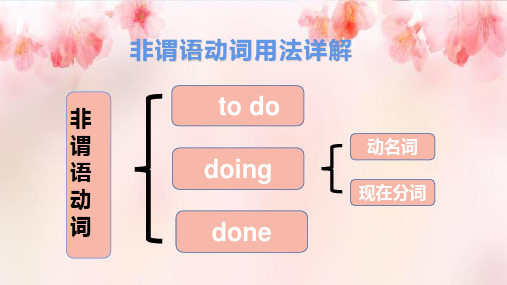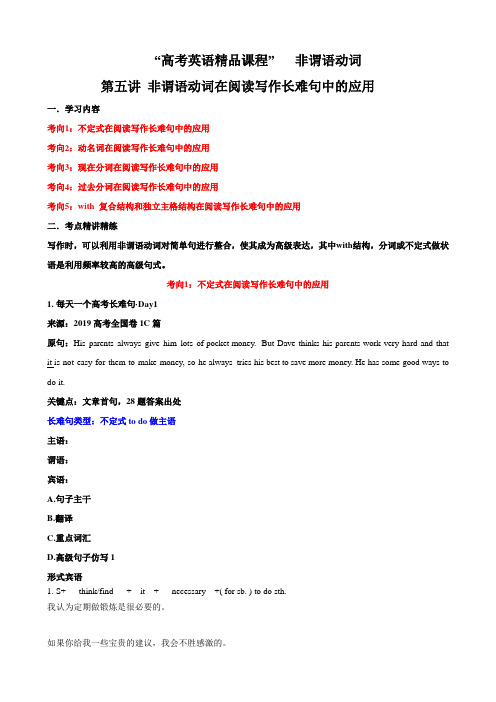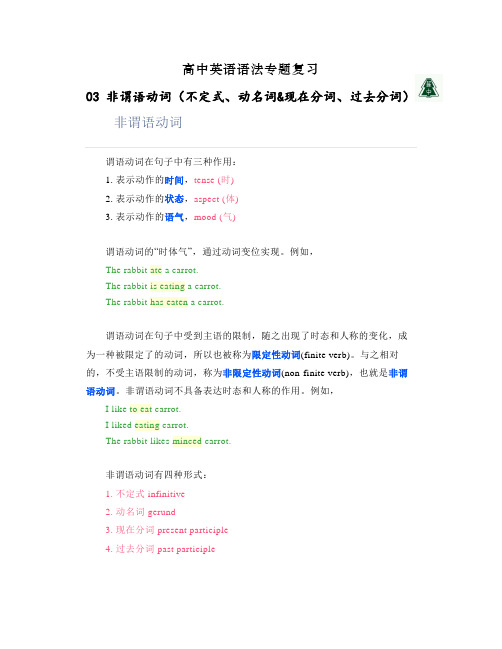[全国版][高三英语专题][第5讲 非谓语动词]讲义(学生版)
高三英语语法复习讲座---非谓语动词

高三英语语法复习讲座----非谓语动词非谓语动词是指动词的三种变化形式,在句中充当除谓语以外的句子成分的动词形式。
非谓语动词分为三种形式:不定式、动名词和分词(分词包括现在分词和过去分词)不定式的构成:是由“to+动词原形”构成即、to do,否定式是not to do不定式可以带宾语或状语构成不定式短语,没有人称和数的变化,但有时态和语态的变化。
不定式的各种形式:主动被动一般时to do to be done进行时to be doing完成时to have done to have been done完成进行时To have beendoing不定式的作用:不定式可以做主语、宾语、状语、表语和定语。
1、作主语不定式作主语时,谓语用单数。
往往用it 作形式主语,把不定式放在谓语后面。
如:It took us two hours to finish the exam.It is important for us to study English well.It is very kind of you to help me with my English.注意:(1)其他系动词如look, appear等也可用于此句型。
(2)当不定式作主语的句子中又有一个不定式作表语时,不能用It is …to…的句型。
试比较:It is to support my own idea to believe him.(错)To believe him is to support my own idea .(对)(3)It is+ adj. of / for sb. to do sth. 结构中,当不定式的逻辑主语和前面的形容词可以构成系表结构时,用of, 否则用for. It’s brave of him to save the boy. 可以说成,He is brave to save the boy.2、作宾语(1)动词+不定式。
高中英语语法非谓语动词详细讲解课件

Getting up early is good habit.
To get up early this morning made me sleepy.
②动名词短语作主语时,常将一些较长的动名词短语置于句尾, 而用it 作形式主语,常用句型有:
no use/good uesful/useless It is/was+ of little use/good +doing sth. a waste of time worth It's no use crying over spilt milk. 覆水难收。 It's waste of time arguing with such a person. It's worth making an appointment before you go.
4. 动名词作定语
动名词作定语的情况并不普遍,一般只限于单个的动名词作名词
的定语,表示所修饰名词的用途或功能,在意义上相当于“名词
+for+ doing”。
swimming pool 游泳池
reading material 阅读材料
walking stick 手杖
opening speech 开幕词
2. 动名词作宾语
第5讲 非谓语动词在阅读写作中的应用(学生版)(通用版)

“高考英语精品课程” 非谓语动词第五讲非谓语动词在阅读写作长难句中的应用一.学习内容考向1:不定式在阅读写作长难句中的应用考向2:动名词在阅读写作长难句中的应用考向3:现在分词在阅读写作长难句中的应用考向4:过去分词在阅读写作长难句中的应用考向5:with 复合结构和独立主格结构在阅读写作长难句中的应用二.考点精讲精练写作时,可以利用非谓语动词对简单句进行整合,使其成为高级表达,其中with结构,分词或不定式做状语是利用频率较高的高级句式。
考向1:不定式在阅读写作长难句中的应用1.每天一个高考长难句·Day1来源:2019高考全国卷1C篇原句:His parents always give him lots of pocket money. But Dave thinks his parents work very hard and that it is not easy for them to make money, so he always tries his best to save more money. He has some good ways to do it.关键点:文章首句,28题答案出处长难句类型:不定式to do做主语主语:谓语:宾语:A.句子主干B.翻译C.重点词汇D.高级句子仿写1形式宾语1. S+ think/find + it + necessary +( for sb. ) to do sth.我认为定期做锻炼是很必要的。
______________________________________________________________________________________________________________________________________________________形式主语2. It is / was + adj. Necessary/ important+ ( for sb. ) to do sth. / clause保持积极的心态是很重要。
[全国版][高三英语专题][第5讲 非谓语动词]讲义(教师版)
![[全国版][高三英语专题][第5讲 非谓语动词]讲义(教师版)](https://img.taocdn.com/s3/m/a9dd91450242a8956aece4a8.png)
第5 讲非谓语动词1.非谓语动词是高中英语教学的重点和难点,在高考中通常以单项填空、语法填空或短文改错的题型考查,分值在2-4 分。
2.非谓语动词的命题热点多是借助于基本概念,在语境中考查常用动词的各种非谓语形式以及个性动词后的非谓语形式。
有时也涉及非谓语动词逻辑主语的一致性问题以及独立主格结构中非谓语的各种变化。
3.非谓语动词的灵活掌握不仅能够帮助学生提高语法得分,而且有助于学生理解完形填空和阅读理解中的长难句,在写作中灵活使用非谓语动词更能使文章显得地道和精炼,提高写作得分。
观看MV《王二小》,划出下列句子中的非谓语动词,并说明该非谓语动词在句中的成分。
1.Herding the cattle is Wang Erxiao’s job.2.Wang Erxiao wanted to cheat the enemy.3.The enemy found themselves lost in the mountain.4.The wind spread the moving story all over China.5.They caught Wang Erxiao to ask for directions.非谓语动词的形式非谓语动词形式主动被动不定式to do to be doneto be doing -to have done to have been done 现在分词doing being donehaving done having been done 过去分词- done动名词形式同现在分词不定式一、不定式作主语不定式作主语时,常用it 作形式主语,而将作主语的不定式放在句子后部。
如:It is good to help others.【即学即练】1.When and where to build the new factory yet.A.has not decidedB. are not decidedC. is not decidedD. have not decided【参考答案】C,动词不定式作主语,其谓语通常用单数形式,故选C。
高考英语专题《非谓语动词讲解》 (全面详细)精品课件

2. Our work is serving the people. 表语
3. I remember being taken to Wuhan when I was a very small child. 宾语
4. We have a swimming poor in the back
yard.
定语
11
动名词与不定式作主语,表语的区别 动名词作主语时往往表示一般性的、习惯性的动 作;而不定式作主语则表示在具体情况下特定的 或一次性的动作。但有时可以通用。
12
只能用动名词作宾语的动词
1.advise, allow, avoid, admit, consider, delay, enjoy, escape, excuse, finish, imagine, mind, miss, permit, practise, risk, suggest, appreciate
主动(vt.) 被动(vt.) 主动(vi.) 被动(vi.)
一般式 to do to be done to do
/
进行式 to be
/
to be
/
doing
doing
完成式 to have to have to have
/
done been do式是指带 to 的动词原形( 使用中有时不带 to ) (一) 作主语 To see is to believe. To see you is glad.=It is glad to see you. (二)作宾语 I want to see you. (三)作表语 My hope is to see you.
9
动名词(主、宾、定、表)
主动 被 动 主动 被 动
高考英语语法专题复习:非谓语动词讲义(不定式、动名词

高中英语语法专题复习03 非谓语动词(不定式、动名词&现在分词、过去分词)非谓语动词谓语动词在句子中有三种作用:1. 表示动作的时间,tense (时)2. 表示动作的状态,aspect (体)3. 表示动作的语气,mood (气)谓语动词的“时体气”,通过动词变位实现。
例如,The rabbit ate a carrot.The rabbit is eating a carrot.The rabbit has eaten a carrot.谓语动词在句子中受到主语的限制,随之出现了时态和人称的变化,成为一种被限定了的动词,所以也被称为限定性动词(finite verb)。
与之相对的,不受主语限制的动词,称为非限定性动词(non-finite verb),也就是非谓语动词。
非谓语动词不具备表达时态和人称的作用。
例如,I like to eat carrot.I liked eating carrot.The rabbit likes minced carrot.非谓语动词有四种形式:1. 不定式 infinitive2. 动名词 gerund3. 现在分词 present participle4. 过去分词 past participle谓语动词是简单句的核心动词,非谓语动词只可能出现在其他的句子成分中。
1. 主语例:Swimming makes us hale and hearty.2. 宾语例:Janet suddenly stopped talking.3. 表语/主语补语例:Her wish is to become a doctor in the future.4. 宾语补语例:I invited him to come here.5. 定语例:Don't disturb the sleeping dog.6. 状语例:He went to the supermarket to buy a pen.不定式、动名词句子的核心动词只能由谓语动词充当,而非谓语动词可以充当句子的其他成分。
高考英语语法非谓语动词课件

动词不定式作主语
不定式结构所表示的动作是谁做的,即不定式的逻辑主 语,通常可以通过 for sb. to do sth. 的结构表达:
It is not necessary for us to finish (finish) all the work tonight. It is important for all the students to learn (learn) English well.
动词不定式作状语
一、作目的状语
to do 可以与 in order to / so as to 相互替换,均表示“为了”
① She opened the window to get some fresh air. ② My father got up early in order to have enough time to pack. ③ He left early so as not to miss the last train.
-ing分词作状语
五、作结果状语
It rained heavily, causing (cause) severe flooding in that area. The old man died, leaving (leave) nothing but debts.
六、作伴随状语
Our teacher went into the classroom, holding (hold) a book in her hand. He sat by the roadside, begging (beg).
动词不定式作表语
不定式作表语对主语起补充说明作用
主语通常是以 aim, duty, hope, idea, job, plan, problem, purpose, thing, wish等 名词为中心的短语,或以what引导的名词性从句
非谓语动词讲义-高三英语一轮复习

高三一轮复习非谓语动词动词不定式(to do)、分词(现在分词v+ing,过去分词done)和动名词统称为非谓语动词。
现代英语将现在分词和动名词合为一大类叫作v + ing形式。
这些动词的形式不能在句中单独作谓语用,因而没有语法主语。
但可以有逻辑主语。
由于没有语法主语,也就不受人称和数的限定,因为不是谓语,也就没有时态和语态,但这些词仍能表示动作和状态,所以仍有表示与其他动词相对时间关系的形式。
由于与其它词有逻辑上的主谓关系,因此也有表示主、被动的形式,同时也有自己的宾语和状语,一起构成非谓语动词的短语(动词不定式短语,分词短语,动名词短语)。
非谓语动词在英语语法中占有特殊且重要的位置。
非谓语动词形式多样,应用广泛,且在句中起着很活跃的作用,也是语法项目中的重点和难点,学好非谓语动词,才能正确进行口语和书面的交流。
(一)1、动词不定式的形式变化:动词不定式有下列时态和语态的形式变化。
2.动词不定式的基本用法:动词不定式能起名词、形容词和副词的作用,可在句中作主语、表语、宾语补足语、定语和状语用.E.g. 1.做主语: To help each other is good.(动词不定式作主语时,一般可用it作形式主语,而将作主语的动词不定式置于句末,如:It is good to help each other.3..不定式作表语1)不定式作表语一般表示具体动作,特别是表示将来的动作。
To do two things at a time is to do neither.次做两件事等于未做。
4.动词不定式在句中作宾语,如带有宾语补足语时,须先用it作形式宾语,而将该动词不定式后置,如:I don’t think it right to do it that way.作定语:动词不定式作定语时,须位于被其修饰的名词或代词之后,如:Is this the best way to help him? 和定语用的动词不定式如果是不及物动词,不定式后面就要用必要的介词,如:He is the man to depend on. 如果被不定式修饰的名词为place, time, way,不定式后面的介词,习惯上可以省去,如:The old man is looking for a quiet place to live.作状语:动词不定式可以作下列的状语:①目的状语: Every morning he gets up very early to read English(二)ing形式:动词的ing形式也是一种非谓语动词。
高三英语一轮复习 第五讲 非谓语动词课件 新人教版共88页文档

21、要知道对好事的称颂过于夸大,也会招来人们的反感轻蔑和嫉妒。——培根 22、业精于勤,荒于嬉;行成于思,毁于随。——韩愈
23、志命运往往背道而驰,决心到最后会全部推倒。——莎士比亚
25、学习是劳动,是充满思想的劳动。——乌申斯基
谢谢!
高三英语一轮复习 第五讲 非谓语动词
课件 新人教版
21、没有人陪你走一辈子,所以你要 适应孤 独,没 有人会 帮你一 辈子, 所以你 要奋斗 一生。 22、当眼泪流尽的时候,留下的应该 是坚强 。 23、要改变命运,首先改变自己。
24、勇气很有理由被当作人类德性之 首,因 为这种 德性保 证了所 有其余 的德性 。--温 斯顿. 丘吉尔 。 25、梯子的梯阶从来不是用来搁脚的 ,它只 是让人 们的脚 放上一 段时间 ,以便 让别一 只脚能 够再往 上登。
(最新整理)高中英语模块五非谓语动词分词精讲课件必修5

interested感兴趣的 excited感到激动的 delighted感到高兴的 disappointed感到失望的 encouraged感到鼓舞的 pleased感到愉快的 puzzled感到费解的 satisfied感到满意的 surprised感到惊异的 worried感到担心的
2021/7/26
2021/7/26
主动,与主句谓语动词同时或基本 同时发生
主动,先于谓语动词发生
被动 被动,正在进行,一般作原因状语放 句首
被动,先于谓语动词发生
20
A.作时间状语:
①When they heard the bad news,they couldn’t help
crying.
= _H_e_a_r_i_n_g(hear) the bad news, they couldn’t help
• The other day, I had my pocket __p_ic_k_e_d__(pick) on the
bus.
• I am sorry to have kept you ___w_a_i_ti_n_g___(wait) for so
lon2g02a1/7/t2i6me.
18
• have sb doing sth使...一直做 • get sb/sth doing sth使...开始行动 • have/get sth done使...被做 • have sth done 使...遭受 • make oneself heard/understood
总结: 过去分词作定语:表示被动
2021/7/26
16
• 注①:如果所表示的动作此刻正在发生,用现在 分词的被动形式来表示,如:
- 1、下载文档前请自行甄别文档内容的完整性,平台不提供额外的编辑、内容补充、找答案等附加服务。
- 2、"仅部分预览"的文档,不可在线预览部分如存在完整性等问题,可反馈申请退款(可完整预览的文档不适用该条件!)。
- 3、如文档侵犯您的权益,请联系客服反馈,我们会尽快为您处理(人工客服工作时间:9:00-18:30)。
第5 讲非谓语动词1.非谓语动词是高中英语教学的重点和难点,在高考中通常以单项填空、语法填空或短文改错的题型考查,分值在2-4 分。
2.非谓语动词的命题热点多是借助于基本概念,在语境中考查常用动词的各种非谓语形式以及个性动词后的非谓语形式。
有时也涉及非谓语动词逻辑主语的一致性问题以及独立主格结构中非谓语的各种变化。
3.非谓语动词的灵活掌握不仅能够帮助学生提高语法得分,而且有助于学生理解完形填空和阅读理解中的长难句,在写作中灵活使用非谓语动词更能使文章显得地道和精炼,提高写作得分。
观看MV《王二小》,划出下列句子中的非谓语动词,并说明该非谓语动词在句中的成分。
1.Herding the cattle is Wang Erxiao’s job.2.Wang Erxiao wanted to cheat the enemy.3.The enemy found themselves lost in the mountain.4.The wind spread the moving story all over China.5.They caught Wang Erxiao to ask for directions.非谓语动词的形式非谓语动词形式主动被动不定式to do to be doneto be doing -to have done to have been done 现在分词doing being donehaving done having been done 过去分词- done动名词形式同现在分词不定式一、不定式作主语不定式作主语时,常用it 作形式主语,而将作主语的不定式放在句子后部。
如:It is good to help others.【即学即练】1.When and where to build the new factory yet.A.has not decidedB. are not decidedC. is not decidedD. have not decided2.It is not unusual for workers in that region .A.to be paid more than a month laterB. to be paid later than more a monthC. to pay later than a month moreD. to pay later more than a month3.In fact is a hard job for the police to keep order in an important football match.A.thisB. thatC. thereD. it二、不定式作宾语1.不定式作宾语时通常用于want, hope, wish, agree, learn, pretend, refuse, manage, claim, fail, promise, plan, offer, prefer, attempt 等词后。
2.find, make, think, consider, feel 等动词不能直接接不定式作宾语,需用it 代替不定式作形式宾语。
如:This has made it necessary for agriculture and industry to develop very quickly.3.“ 动词+ 疑问词+ 不定式” 结构中的疑问词通常有what, when, where, which, how, whether 等,但不能用why。
【即学即练】1.She pretended me when I passed by.A.not to seeB. not seeingC. to not seeD. having not seen2.Mr. Johnson preferred heavier work to do.A.to have givenB. to be givingC. to be givenD. having given3.The chairman thought necessary to invite Professor Smith to speak at the meeting.A.thatB. itC. thisD. him4.There are so many kinds of tape-recorders on sale that I can't make up my mindto buy.A.whatB. whichC. howD. where5.It is said in Australia there is more land than the government knows .A.it what to do withB. what to do it withC.what to do with itD. to do what with it三、不定式作定语1.不定式作定语多表示未来动作,而动词-ing 形式作定语多表示正在进行的动作。
不定式的被动式、动词-ing 形式和过去分词都可以表示被动动作,但动作发生的时间不同。
Example:下周要召开的会议非常重要。
The meeting to be held next week is of great importance.现在正在召开的会议非常重要。
The meeting being held now is of great importance.上周召开的会议非常重要。
The meeting held last week is of great importance.2.不定式作定语,有时与前面被修饰的名词逻辑上有动宾关系。
如果不定式是不及物动词或所修饰的名词是不定式的地点、工具等,不定式后面须有相应的介词。
如:I haven't got a chair to sit on.【即学即练】1.There are five pairs , but I'm at a loss which to buy.A.to be chosenB. to choose fromC. to chooseD. for choosing2.When I handed the report to John, he said that George was the person .A.to sendB. for sending itC. to send it toD. for sending it to3.Would you please give me a piece of paper ?A.to writeB. to write onC. to write withD. to be written4.If the building project by the end of this month is delayed, the construction company will be fined.A.being completedB. is completedC. to be completedD. completed四、不定式作表语有一些系动词,如appear, remain, happen, seem, turn out 等后面要接不定式。
【即学即练】1.Having a trip abroad is certainly good for the old couple, but it remains whether they will enjoy it.A.to seeB. to be seenC. seeingD. seen2.The man we followed suddenly stopped and looked as if whether he was going in the right direction.A.seeingB. having seenC. to have seenD. to see五、不定式作状语1.不定式作目的状语一般的表现形式为to do,但也常出现in order to do, so as to do, in an effort to do, in an attempt to do 等复合形式。
不定式作目的状语时,它的逻辑主语应与句子的主语保持一致。
不定式状语置于句首时,通常与主句间有逗号分割;置于句尾时,通常与主句间没有逗号分割。
2.不定式作结果状语,表示一种没有预料到的结果。
常用下列搭配:only to do / never to do, so + adj. + as to, such ... as to ... enough for sb. to do, too ... to do。
不定式作结果状语,常置于句尾,可与前面的主句间有逗号分隔。
Example:The tea is too hot to drink.Is your brother old enough to join the army?He lifted a rock only to drop it on his own feet.What have I done to make you so angry?【即学即练】te in the morning, Bob turned off the alarm.A.To sleepB. SleepingC. SleepD. Having slept2.Tom kept quiet about the accident lose his job.A.so not as toB. so as not toC. so as to notD. not so as to3.The driver turned his car sharply to the left to give the way to the running bull onlya tree by the road.A.to knock intoB. knocking downC. to knock atD. knocked over4.He tried many times to crawl over the fence after evening class, each time by the guards in our school.A.being caughtB. to be catchingC. only to be caughtD. catching5.Lily's mobile phone was left in a taxi accidentally, never again.A.to findB. to be foundC. findingD. being found六、不定式作宾语补足语1.有些动词和短语可用不定式作宾语补足语,即构成“动词+ 宾语+ to do sth.”。
